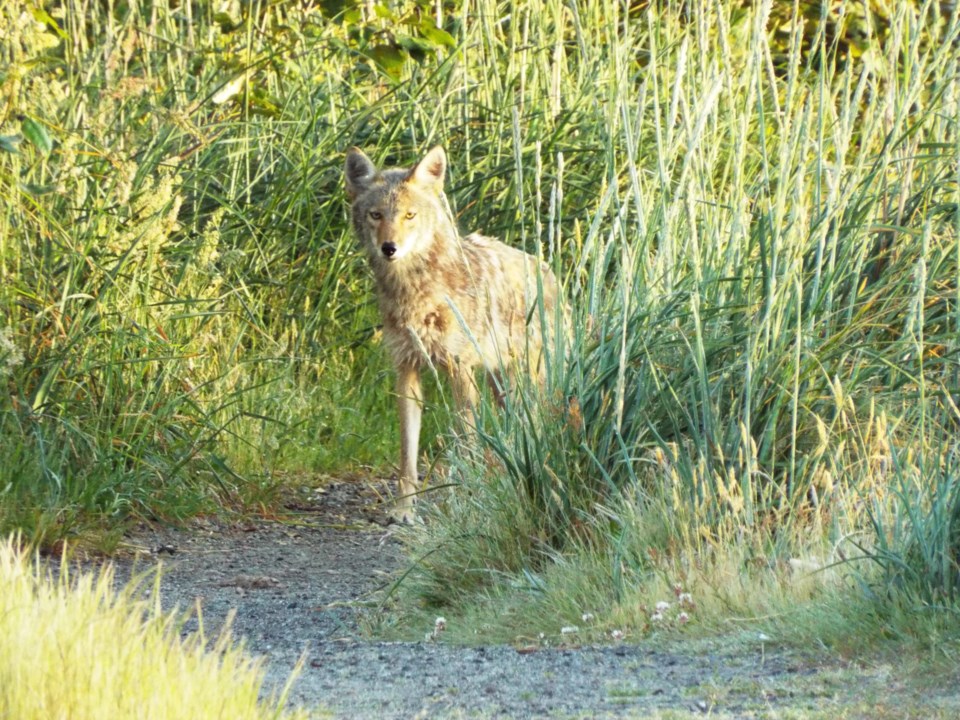Lynn Atkinson gave her adult daughter a kitten about a year ago as a gift. But on May 24, Christopher Columbus, as the cat was named because he so liked to explore, was taken by a coyote from near the daughter’s backyard in Garibaldi Highlands.
“It was really, really tragic,” said Atkinson, still sounding choked up by the incident when she spoke with The Squamish Chief on Sunday.
“Christopher just had this special something… he was super-friendly,” she said.
The morning the cat was taken, the daughter’s boyfriend heard a screech outside at about 5 a.m. He bolted out of bed, grabbed a golf club and chased the coyote. The coyote dropped the cat, which was then quickly rushed to the vet.
Though things looked hopeful for a while, the cat’s internal injuries were too great, and he succumbed to his injuries on May 28.
“It is just really, really sad,” Atkinson said, adding she thinks the coyote situation is out of control in Squamish. “It is getting to the point that people are telling me they don’t even want to get cats as pets.”
Atkinson has lost two of her own cats to coyotes over the years, she said. Although she has tried to keep her cats indoors at night, she thinks they are happier and healthier if they are allowed to roam.
She said she wants other people to know about what happened to her cat so perhaps something can be done to protect other pets.
Coyotes are active all year in the district but at this time of year they may be travelling further to find food for hungry cubs, according to Meg Toom, WildSafeBC program coordinator.
“They are opportunistic animals and they will take the opportunity if they see it, so small pets are definitely vulnerable,” she said. “We do recommend people keep their pets in, particularly at night.”
She said she often sees cats running around after dark, which makes them vulnerable to not only coyotes, but also cougars and bobcats that prey on cats and are most active at night.
“We don’t look upon leaving our dogs wandering around at night as a good thing to do,” she said. “But the cats are everywhere.”
Coyotes are not born to come near humans; it is a learned behaviour, according to Toom.
“The wariness and the shyness that they typically have when they are born wears off because of the benefit of hanging around neighbourhoods, because there is food.”
Toom said people sometimes inadvertently attract coyotes to their homes and pets.
“Something as simple as feeding birds: If the birdseed is scattering all over the ground, then you are going to bring in rodents and you are going to bring in mice, rats, squirrels, skunks and then those smaller animals are food for the larger animals,” she said. “You might think you are just feeding birds, but you are bringing in the whole food chain into your backyard.”
About 80 per cent of a coyote’s diet is meat, according to Toom.
“The coyotes are definitely hunters,” she said.
Squamish has a healthy coyote population and Toom said around the Squamish Valley Golf course is currently a prime location for the animals.
Toom said it is human instinct when a pet is grabbed by a coyote to chase it, but it’s a bad idea, Toom said.
“Oftentimes with coyotes, where there is one there is more because they have a pack mentality,” she said.
She noted there have been no reports of human injuries caused by coyotes.
Toom said the conservation office receives about 100 calls a year about coyotes in the corridor. Most calls are of sightings or injured coyotes.
No recent reports have been made to the conservation office about cats missing, which Toom said likely means people aren’t reporting the incidents with coyotes. She encourages pet owners to call in so the conservation office can track incidents to see if there is a pattern of activity.
“If coyotes are noted in one neighbourhood incessantly, then something is going on,” she said.
Toom said while it is great to post alerts on social media sites, people should do that last, after alerting conservation officers. “When the [conservation officers] are aware of it, we can do some education and some proactive work,” she said.
Report aggressive behaviour or sightings to the 24-hour Conservation Officer Hotline at 1-877-952-7277.




